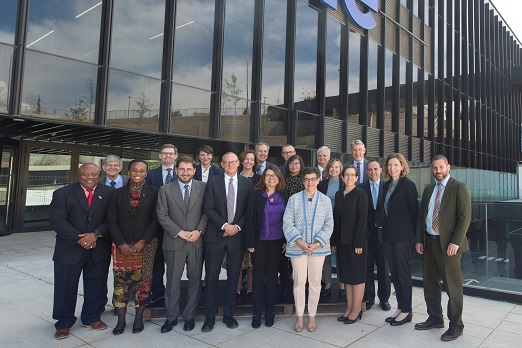APSIA Deans Host Annual Meeting In Spain
From April 21-22, 2022, APSIA gathered for its annual deans/directors meeting, hosted this year by IE University School of Global and Public Affairs in Madrid. Taking place for the first time in Spain, twenty-two representatives from 20 APSIA institutions had a chance to meet face-to-face for the first time since 2020. An additional six institutions participated virtually.
“It is a privilege for IE School of Global and Public Affairs to host this meeting. We have been active members of APSIA for years and this is one way of giving back to the organization. Our world is changing very rapidly and is in dire need of effective training and impactful teaching on global affairs. This is what we aim to do at IE and an objective we share with APSIA colleagues.” said Manuel Muñiz, Dean of the IE University School of Global and Public Affairs and Provost of IE University.
Before the meetings officially began, Manuel Muñiz moderated a public conversation between Arancha González, Dean of the Sciences Po Paris School of International Affairs, and APSIA President Jim Levinsohn, Director of the Yale University Jackson Institute for Global Affairs. During the event, Dean González and Director Levinsohn shared their thoughts on the war in Ukraine, the impact of the COVID-19 pandemic, and the need to transform international institutions.
The meeting itself began on Thursday, April 21 with an audience between APSIA deans/directors and HRM King Felipe VI, an APSIA / Georgetown School of Foreign Service alumnus. The conversation explored ways to engage different communities in international affairs, especially younger generations.
Learn more about the meeting with King Felipe VI here.
Next, Fritz Mayer, Dean of the University of Denver Josef Korbel School of International Studies, moderated a conversation to consider what APSIA schools may look like in the next ten years. Attendees noted the need to understand the influence of new technologies on international affairs, how populism can shape institutions and public discourse, and how to build students’ hard and soft skills.
Then, participants divided into small groups: one to talk about balancing academic freedom and school risk, moderated by Cornelia Woll, President of the Hertie School, and one on mental health in our communities, moderated by Nisha Botchwey, Dean of the University of Minnesota Humphrey School of Public Affairs.
To close out the first day, deans/directors heard from the Mayor of Madrid José Luis Martínez-Almeida Navasqüés and colleagues about ways the city is creating a more ‘efficient, sustainable and prosperous city,’ particularly through the Madrid Nuevo Norte project.
The workshops on Friday, April 22 began with three small group conversations. Elizabeth Ransom, Interim Director of the Penn State University School of International Affairs, moderated a conversation about the 'Great Resignation.' Frank B. Ashley III, Senior Associate Dean of the Texas A&M University Bush School of Government & Public Service and Director of Diversity Initiatives for Texas A&M University, chaired a conversation on improving faculty diversity. Shlomi Dinar, Associate Dean of the Florida International University Steven J. Green School of International and Public Affairs, oversaw an open conversation that covered topics ranging from adapting policies to the current state of the pandemic to applications trends.
Next, Nolan McCarty, Vice Dean of Strategic Initiatives with the Princeton University School of Public and International Affairs, chaired a conversation on advancing international affairs education amid democratic decline and geopolitical tension. Arancha González and Carissa Slotterback, Dean of the University of Pittsburgh Graduate School of Public & International Affairs, offered opening remarks.
To close out the meeting, Caroline Freund, Dean of the University of California, San Diego School of Global Policy and Strategy, moderated a session looking at strategies to adapt APSIA schools to meet the marketplace. The meeting ended with a call for more collaboration and information sharing among the APSIA network.
In addition to the rich conversations, participants learned more about Spanish culture through trips to the Prado and Sorolla museums, the Royal Spanish Academy, and the UNESCO World Heritage town of Segovia. “My colleagues and I so valued the opportunity to meet in person and I know all of us left the meeting with many new ideas about both how to better train the next generation as well as a deeper understanding of the challenges of the day. Being able to meet in Madrid was a special treat, for the city and its many splendors highlighted just what all of us have missed during the absence of international travel." said Jim Levinsohn

